Salesforce report claims AI can save marketers hours a week

A survey jointly conducted by Salesforce and YouGov (via VentureBeat) has revealed new insight into how marketers perceive artificial intelligence tools, and the results play to Salesforce’s tune.
The emerging “game-changer” technology is believed to be able to save those working in marketing around five hours per week, freeing them up time to focus on other tasks and potentially juggle a more diverse workload.
The research comes from 1,029 full-time marketers from the US, the UK, and Australia, the majority of whom already use generative AI tools in their daily work lives.
Is generative AI good for marketing?
More than half (51%) of the respondents said that they are already successfully using such tools in their work, while nearly a quarter (22%) said that they or their company had drawn up plans to implement the time-saving tech soon.
Read more
> The best CRM software
> Salesforce is bringing AI into the CRM game
> Salesforce could be set to cut even more jobs
Of the population currently using AI tools, 76% are relying on them to produce copy and material, 71% for inspiring creative thinking, 63% for analyzing market data, and 62% for generating image assets.
Even so, workers remain vocal about their concerns, with almost one-third (31%) citing accuracy and quality issues, and one-fifth (20%) worried about trusting the smart assistants.
While tools like ChatGPT clearly remain unreliable at best for the jobs that require the most accurate or sensitive information, using AI writers as a basis for marketing is clearly bringing in huge success for those in the industry.
Almost one in five (18%) workers surveyed also raised concerns about job safety, with sentiments shared that artificial intelligence could reduce the number of workers needed, thus making their role redundant.
Already, the company has announced several rounds of layoffs as it battles with the challenging economy and deploys more AI across its operations. More than 9,000 workers have been sent packing since 2022, as those remaining become increasingly concerned about their job security.
Here is a list of our favorite CRM for small businesses

